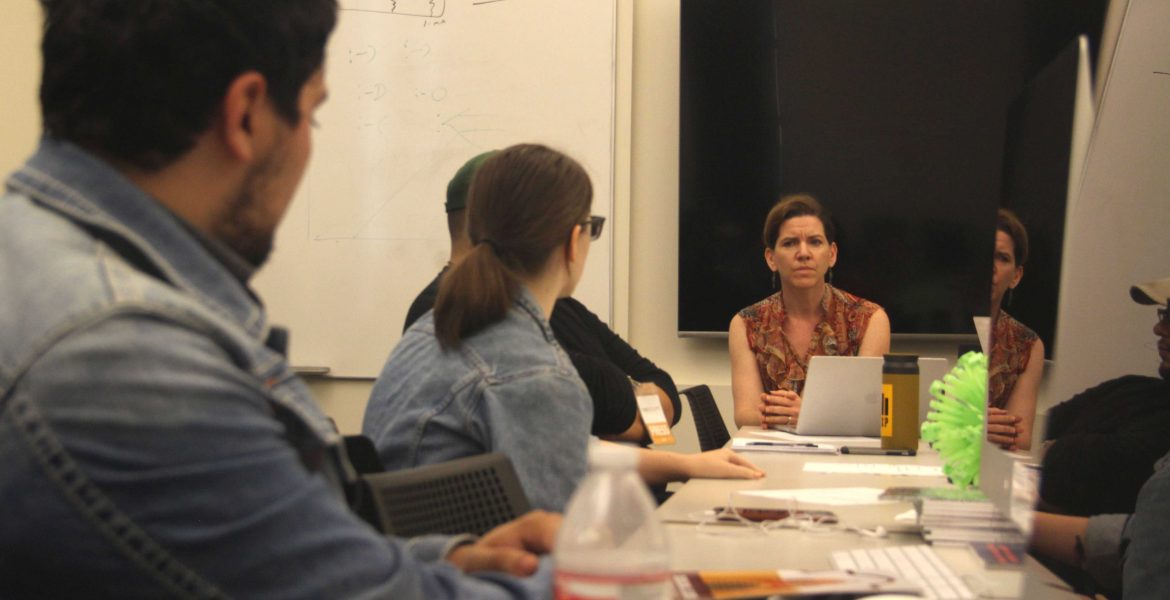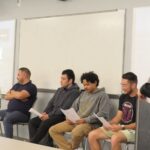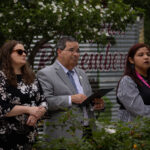The Office of Marketing and Communication collaborated with Jaguar Student Media to create a new student media policy for staff after communication students expressed difficulty conducting interviews.
Managers received the policy April 21 in an email from Jeanette De Diemar, vice president for university advancement and external relations.
The policy provides guidance for staff when contacted for official university statements, areas of expertise or personal viewpoints.
Veronica Valdes served as editor-in-chief of The Mesquite during the spring semester. She said she hopes the new media policy will facilitate obtaining interviews and allow editors to produce news stories at a faster pace.
“I think it’s a step forward (but) I don’t think it’s flawless,” Valdes said. “I think it’s a trial and error type (of situation). It’s a good starting point and I would like to see how it works out next semester.”
Valdes said De Diemar spoke to her more seriously about creating a new student media policy earlier this semester.
De Diemar shared a draft of the policy with members of Jaguar Student Media in early March. Student journalists, faculty advisers and board members who are local professional journalists were able to provide feedback.
With the feedback, Marcom was able to create a new student media policy for staff members. Valdes said the new policy is easier to read and much more simplified than the original draft.
Valdes said editors of Jaguar Student Media outlets should have had a chance to look at the revised version of the policy before it was sent to staff members.
Valdes said the new guidelines will help staff determine if they’re qualified for the interview. Although, reporters typically have an idea if the source they’re contacting is the most qualified.
Previously, university employees told communication students interview requests must be forwarded to Marcom, making it difficult for students to produce news stories. Stories ranged from interviewing Amber Graham, fitness and wellness coordinator, on JagFit classes to speaking with Assistant Chief R.L. Stearns about snow-related incidents.
Krystina Irvin, the Mays Center’s director of experiential learning, said the new policy clearly outlines staff responsibilities. She said this will benefit both student media and staff.
De Diemar said source experts — such as staff responsible for organizing the campus’s voting center— can proceed with student interviews. Staff members can also respond to interview requests regarding their personal view.
Staff must only forward interview requests regarding official university statements to their department’s vice president or supervisor, De Diemar said during an all staff meeting on April 14.
“Each vice president, similar to a corporate structure or other university structures, can determine who spokespeople are to be on the record for their division,” De Diemar said in a phone interview on April 14.
Irvin said she’s “not sure” if forwarding interview requests to vice presidents will be efficient.
“I just hope this doesn’t become an extra step, where a staff forwards it to a vice president only for it to ultimately go to Marcom in the end,” Irvin said.
Previous process hinders media production
The previous process had discouraged communication students as well as the three Jaguar Student Media outlets: The Mesquite, Enlace TV News and El Espejo magazine. Stories risked becoming irrelevant by the time Marcom contacted students to follow through with interviews.
Jocelyn Sandoval, co-editor of El Espejo, said she believes this process is unnecessary.
“I just don’t think we need approval from anybody else besides the person we are interviewing,” Sandoval said.
It’s a more organic process when you don’t have to go through another department and you get real answers instead of a censored version, she said.
Irvin said Marcom typically responded to media requests within a day or two and approved a majority of interviews.
“Typically, if we received a request for an interview of anything from anyone, we needed to go through Marcom to be granted approval to respond to that interview request,” Irvin said.
Irvin said it was somewhat inconvenient having to forward interview requests.
De Diemar said Marcom’s involvement is done to help coordinate interviews. If staff members are asked to be interviewed in an area that isn’t their expertise, they should notify Marcom.
De Diemar also said students benefit from working with Marcom since they are provided real-world experience prior to graduating.
Editors weigh in on the runaround
Brigid Cooley, staff writer for Victory Media and former editor-in-chief at The Mesquite, said she understands the need for Marcom but often experienced the runaround.
“I understand from their perspective what they’re trying to do,” said Cooley, who graduated in December 2020 and now covers city government and other news in Marble Falls.
Cooley said Cristian Sandoval, former executive director of Marcom, was a helpful resource until his departure in fall 2019. Once he was no longer working at the university, it grew more difficult.
“We never knew who we were supposed to talk to,” Cooley said.
De Diemar had told Valdes earlier in the semester during a meeting this was a problem she had inherited. She said there had already been improvements to better support student media.
However, in November, De Diemar notified staff in an email not to respond to media requests and forward requests to herself or Adriana Contreras, director of marketing and communications operations.
“There were times, for example in the pandemic, my team was part of the risk management group so there are times when that is necessary,” De Diemar said in response on April 14.
Valdes said the issue between Marcom and student journalists was here before the pandemic, but the pandemic amplified it. The email Marcom sent to staff did not help, she said.
“Just seeing the email, I would have thought any request (had to be) forwarded to Marcom. I don’t think there was any detailing of when to do this,” Valdes said.
Jocelyn Sandoval said Vivian Hernandez-Serna, who did general assignments for El Espejo, wasn’t able to produce a story about international students because she needed to go through Marcom first.
Hernandez-Serna said she dropped the story since she was on a tight deadline. She has since departed from El Espejo. She said this incident influenced her decision to leave.
Sandoval said El Espejo focuses on reporting students’ point of view since it’s a complicated process to arrange interviews with university employees.
“You don’t need permission to talk to students,” Sandoval said. “We tend to take that route because we know we can play it safer.”
Editors struggle to conduct interviews on campus
Valdes said once after class, a student informed her classmates of an Anti-Human Trafficking Conference. Valdes wanted to interview a student about the conference. The student told Valdes the interview request needed to go through Marcom before she could speak to Valdes.
“I didn’t want it to go to the next level,” she said. “It started to trickle down to students. I don’t know if there were more students, but having that one person already was like the beginning.”
In 2019, Cooley covered a story on dorm parking. She wanted to know why faculty was allowed to park in front of the dorm, limiting space for dorm residents. Her source would agree to an interview with her, then cancel right before the scheduled time.
Sandoval said El Espejo contacted the San Antonio Police Department in October 2019 about a car accident that occurred near the campus’s main entrance. She said they were able to get information much quicker than if they had reached out to the University Police Department.
“Our first instinct is no longer to approach somebody from our campus,” Sandoval said.
De Diemar said her department has a responsibility to both support student media journalists while also doing the work the department needs to do at the university.
The campus saw a COVID-19 spike in the fall, Valdes said she was doing research on the spike in cases and needed to contact a COVID monitoring group.
De Diemar told Valdes to direct questions to her and she would forward them to the group; this caused a delay in her story. Valdes said the only reason the story didn’t lose relevance is because the COVID cases consistently stayed high for a few weeks.
“I think we should kind of pave the way for future waves of student journalists,” Valdes said. “It shouldn’t stay like how it was. These guidelines that went out, we’ll see how they work next semester.”
Asiah Mendoza contributed to this story.







